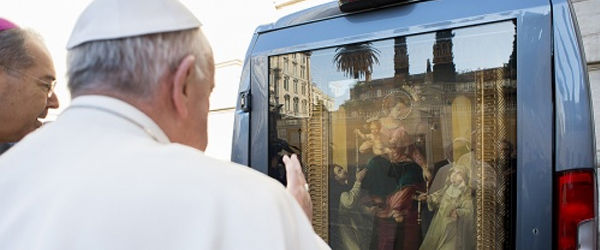Maria Gibson held tight to her family secret for many years — until one day she discovered that, in sharing it, she found freedom.“Fear and stigma affects a lot of people who are living in silence,” said the member of the National Alliance of Mental Illness, who was attending the 11th annual Conference on Mental Health and Spirituality “New Season,” sponsored by the County of Los Angeles’ Department of Mental Health recently at the Cathedral of Our Lady of the Angels’ Conference Center.“That is why,” Gibson continued, “it is important to have spiritual support together with professional supervision.”Gibson’s youngest brother was diagnosed with schizophrenia at age 11. Violent behavior prevailed in their home, which led Gibson and her sister to leave once they could. But her younger brother stayed, absorbing the effects of the violence lived at home, Gibson said.“I am blessed,” she said of the solution she found to her problems when she joined NAMI.In her journey to recovery and forgiveness, Gibson and her family also discovered that there is no way out without developing a spiritual life.That was the core of the presentation of keynote speaker Dr. Kathleen McKenna, training director of the child and adolescent psychiatry fellowship program at Harbor-UCLA, who has had a “long-standing interest in the integration of spirituality and mental health.“Spirituality has to be part of the curriculum,” she told a packed conference room, mostly representatives of mental healthcare providers and religious institutions. “We should be Agape-loving our patients.“About 90 percent of people worldwide have some kind of religious affiliation; 70 percent of people in the U.S. believe in God and more than 40 percent of psychiatrists believe in God,” she noted. “So there is a mismatch with the general population in our clinical role. Clients want to talk about their spiritual beliefs, but they are afraid to bring it up because they either feel it’s too private or that the professional won’t understand.”The self-declared Christian physician urged participants to have an “open-minded attitude, humility and to be constant learners.”After offering examples of her practical experience with autistic and schizophrenic children, she suggested the development of therapies that integrate religion and spirituality with other aspects of the person’s life, such as culture, community, and genetics. The event featured the ecumenical panel, “A Partnership in Action: Linking Mental Health and Spirituality,” where members of the Department of Health’s Clergy Advisory Committee expanded on different approaches, access and training to mental, spiritual and physical health.“We’re all about establishing a sense of trust,” said Suzanne D. Healy, archdiocesan director of the Victims Assistance Ministry. The office was created in the midst of the sexual scandal that affected many Catholic families and parishes.“We create a safe and compassionate environment for victims to come forward while ensuring that civil authorities are notified,” said Healy, a licensed marriage and family therapist.Other workshops included “Healing Effects of Meditation: Experiential Workshop of Catholic Centering Prayer and Buddhist Traditions,” “Islam Spirituality and Mental Health,” and “The Use of Drumming and Spirituality for Indigenous People in Recovery.”The conference was an opportunity for Christians to mingle with people from other faiths, and learn from each other, according to participants.For more information about the archdiocesan Victims Assistance Ministry, call (213) 637-7650. For more about the L.A. County Department of Mental Health, visit www.dmh.lacounty.gov.{gallery width=100 height=100}gallery/2012/0720/mentalhealth/{/gallery}

